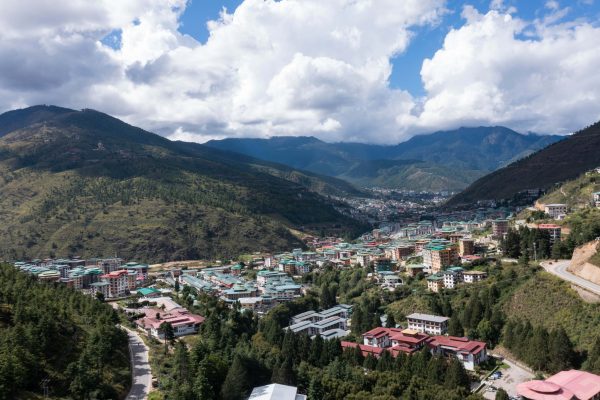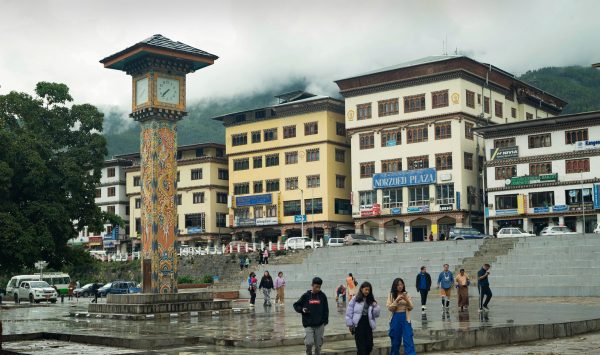
Gross National Happiness within the Doughnut
Thimphu Structure Plan
Thimphu, Bhutan
Bhutan is at a turning point. Rural to urban migration – and the whole process of accelerating urbanisation, is placing acute pressure on limited available land, precious natural assets, threatening irreversible damage.
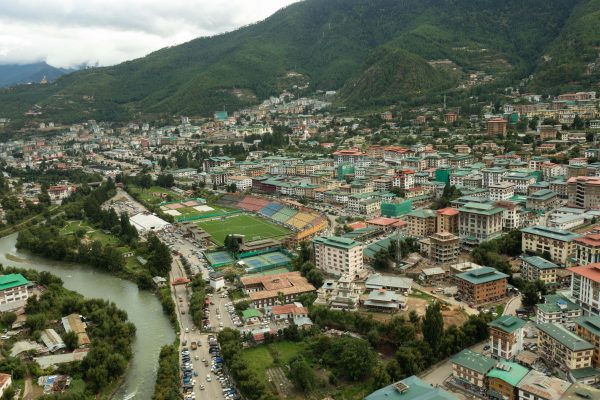
Set in the Eastern Himalaya, at an elevation of 2,500 metres, the capital city of Thimphu has grown rapidly since 2003, yet the quality of life for the majority of residents is falling short of Bhutan’s foundational aspiration of Gross National Happiness. Working arm-in-arm with the Royal Government of Bhutan since 2019, Prior + Partners has helped lead an inter-disciplinary consultant team including ARUP and Gerald Eve. With the guidance of an expert international advisory panel, including Kate Raworth and the Doughnut Economics Action Lab, we have developed together the vision and future spatial strategy for Thimphu and the surrounding region, integrating Gross National Happiness firmly within the ‘Doughnut’. Doughnut Economics is a socio economic framework which helps to strike a balance between essential human needs, our social foundation, and the planet’s ecological limits.
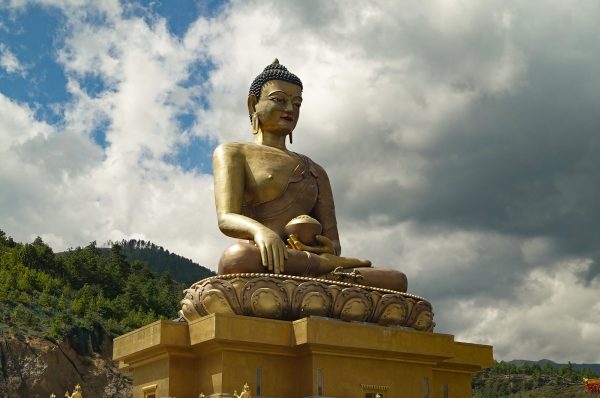
The newly adopted Thimphu Structure Plan provides a key tool to catalyse a more regenerative and distributive approach to socio-economic development over the next 20+ years. The goal is to invest in creating a place of opportunity for the benefit of the whole community; cultivating a better balance with nature and the living culture of Bhutan, a vision that is inspiring to all stakeholders. To help with its implementation, an accompanying new Design Code for Thimphu will improve the form of development and quality of the built environment overall within the city.
Good growth in the right places
The principle of directing ‘good growth in the right places’ will guide the long-term transformation of the City and region, ensuring that the social conditions of residents are improved in a way that protects Bhutan’s unique Buddhist culture, while working within the ecological ceiling of a globally important, carbon positive forest reserve. 60,000 new jobs will be created to build critical capacity and diversify the economy, while over 20,000 secure and affordable new homes will help reinforce the social foundation in this rapidly changing urban context.
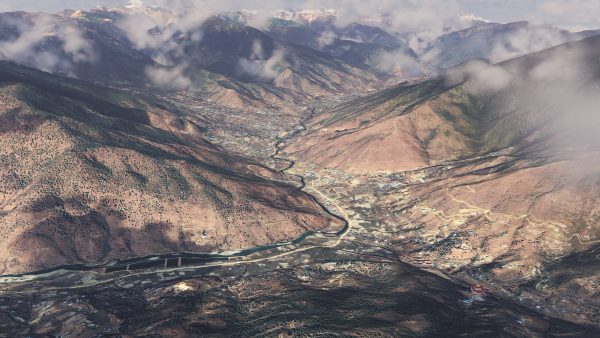
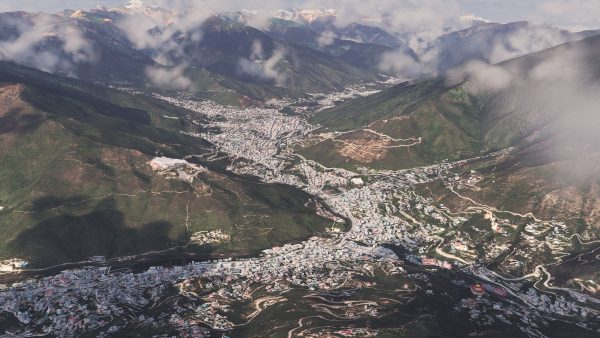

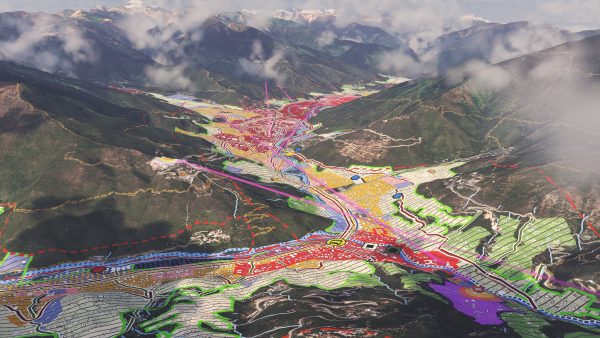
In collaboration with the client team, we have helped bring this vison to life by identifying ‘what life looks like now’ for a series of imagined households: young, old, those building careers and forming families. Arising through a city-wide consultation process and presented through an innovative virtual engagement platform, this visioning process helped paint a picture of the current struggles being faced, and how these problems will be transformed over time by improving access to: the right kinds of skills and livelihoods; affordable high quality housing and community-based social infrastructure; and the key places that are important to people everyday.
City Centre Action Plan
Digging deeper to unlock immediate opportunity and positive change, the City Centre Action Plan will help focus investment in releasing public land for public benefit within the City. While there has been effective commercialisation and dense development of private land over the last 20 years, many areas of the City remain underutilised, particularly on publicly owned land within the City centre.
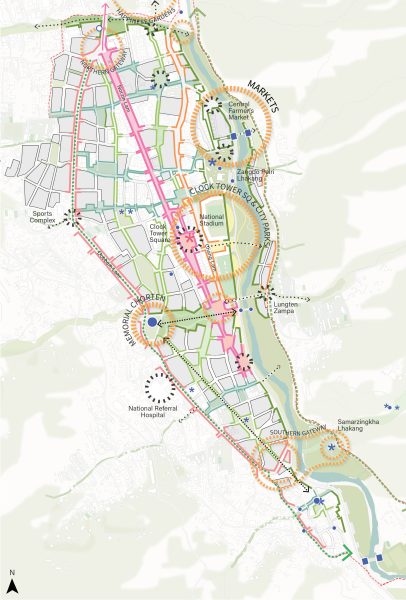
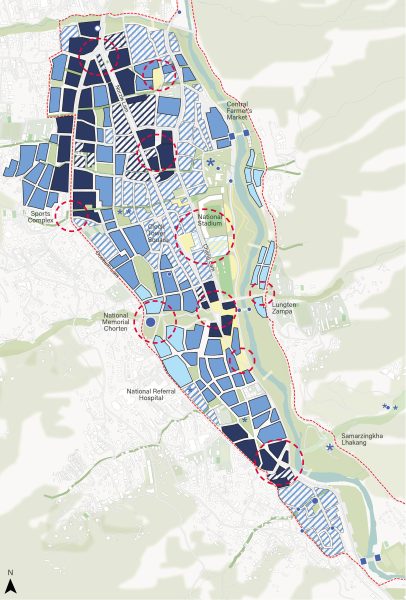
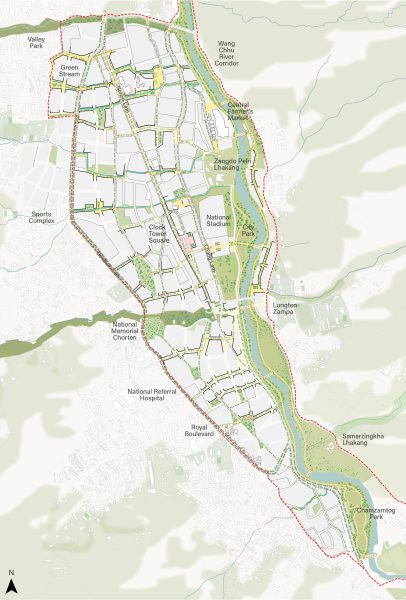
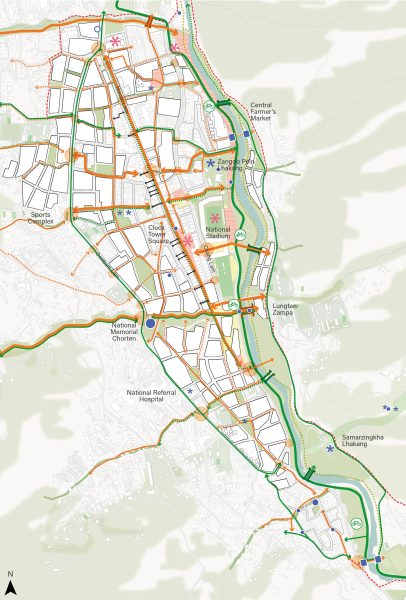
The goal will be to reinforce economic opportunity in key city centre locations, like at the Centenary Farmer’s Market and Cultural Quarter – and at local neighbourhood centres, creating community-based urban housing and major improvements to the public realm and streets.
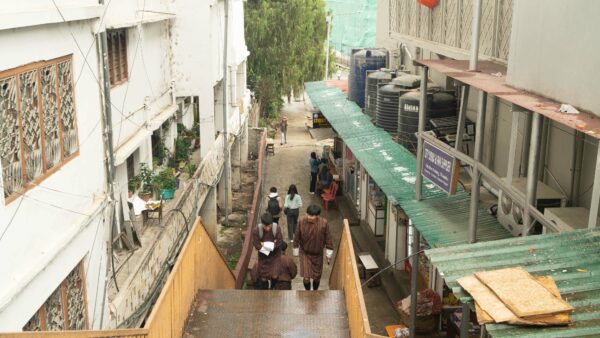
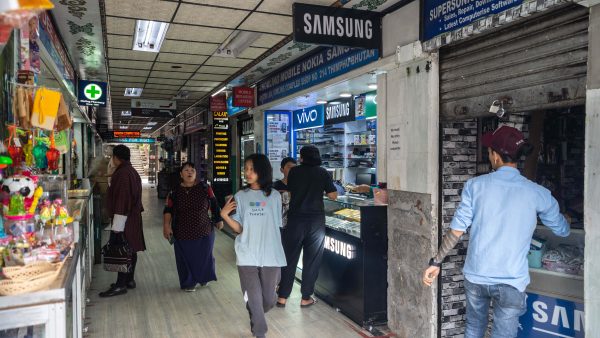
A new Royal Parks and green infrastructure network will extend along the main Wang Chhu river valley and tributary streams, linking communities and building resilience naturally. A priority programme of water and other infrastructure improvements will better balance the demands of people while protecting nature and the forest setting of the city. Walking, e-cycling and a pioneering low emission, bus-based public transport system will reduce car dependency, releasing space for active use, bringing people together.
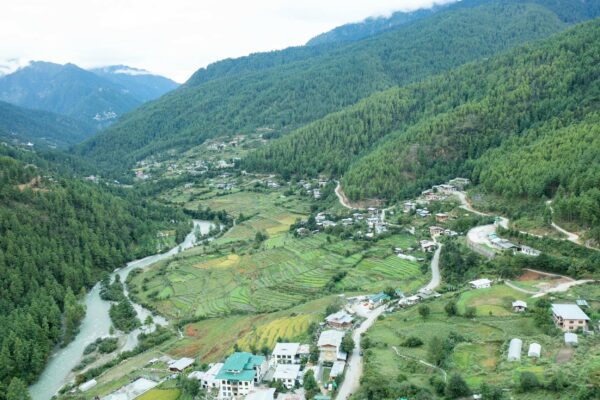
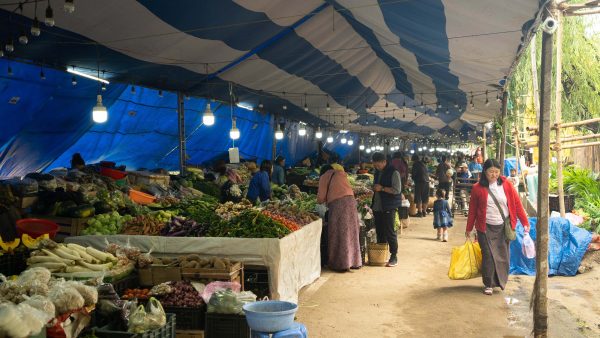
Beyond the city itself, local valley specific initiatives consider food security and modern organic farming practices to invigorate the connection between culture and landscape, and a renewed relationship with agrarian life. With no supermarkets in the city, fresh produce is supplied through household owned, usually women-led micro-businesses, which will be supported within the vision.
Community action
Youth unemployment and outward emigration has become a serious problem post-COVID, as many people seek immediate economic opportunity beyond Bhutan. In response to this challenge – and as a non-violent society, a truly unique national community service and training programme has been established to develop skills and foster entrepreneurship across the economy. One good example includes a major value creation initiative linking construction and architecture back towards mass timber and other bio-based materials, reconnecting ‘forest to frame’, with the potential to unlock up to 12,000 attractive, safe jobs.
Striking the balance
Our inter-disciplinary team’s work provides the opportunity to show what living well in a city can look like – not measured simply by high GDP, but by a well-adjusted Gross National Happiness. How can you make our cities more inclusive, and more equitable while also living within the ecological ceiling? We have demonstrated in Thimphu that there is no need to simply continue to expand the city, further consuming precious land, but rather regenerate what’s already there, with gentle intensification and reorganisation towards more distributive practices.
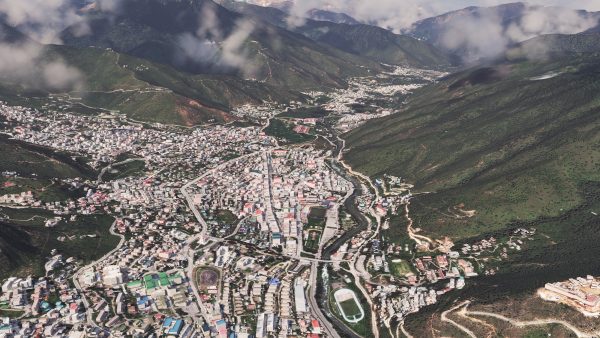
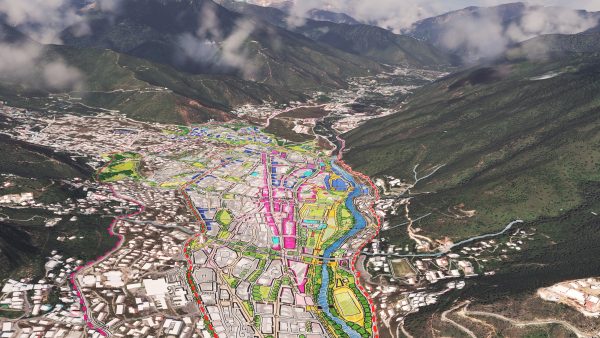
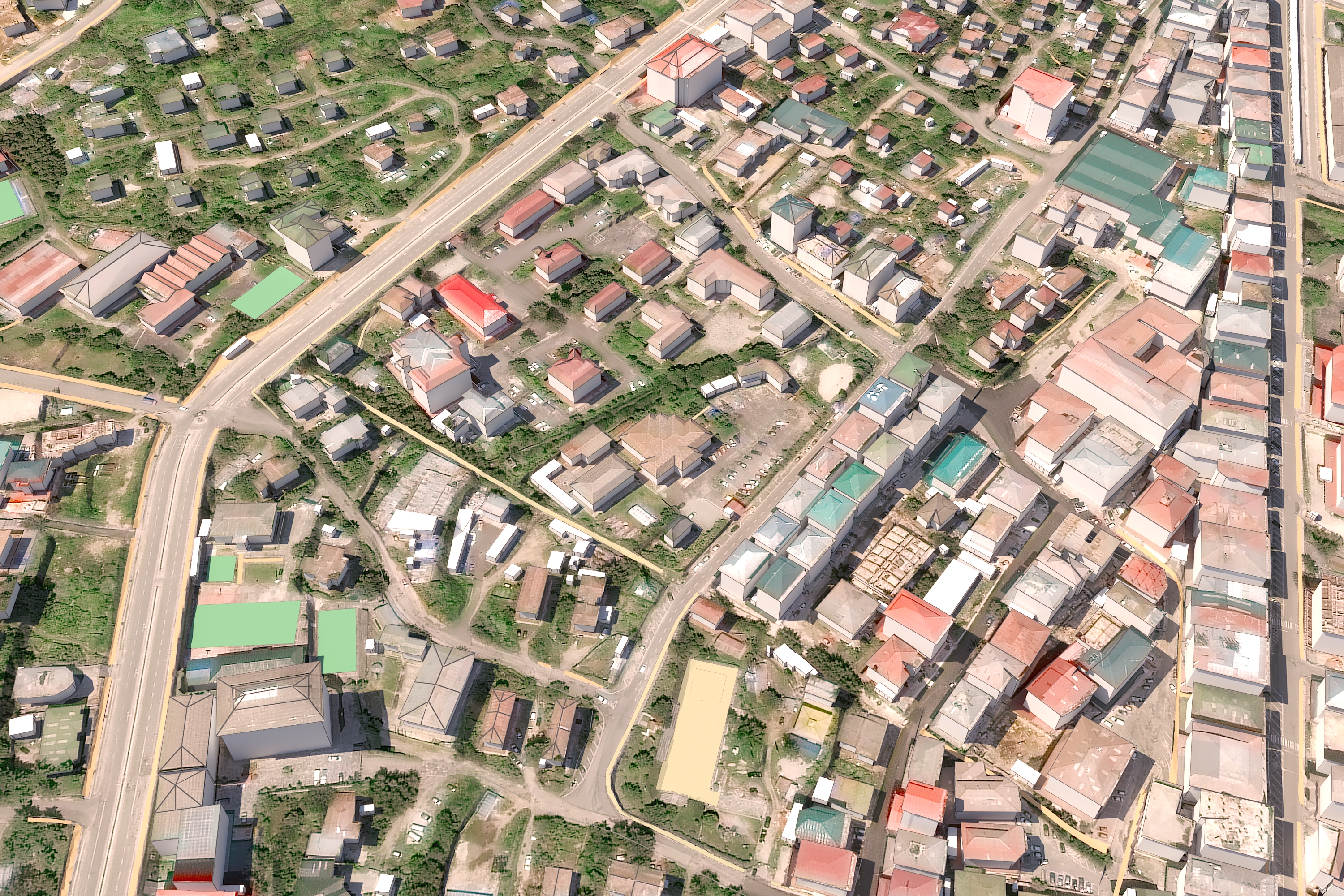
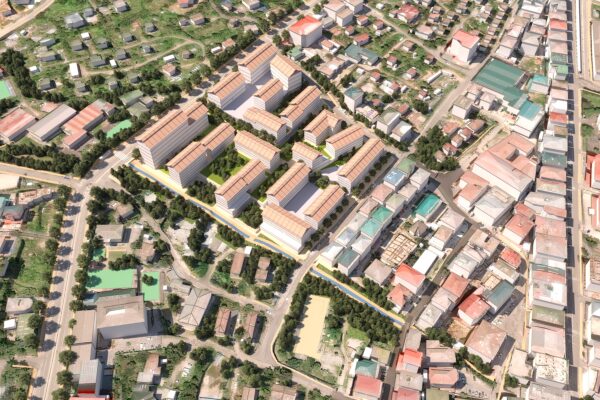
Alongside other Doughnut Economics Action Lab models like Costa Rica, Thimphu is a case study in how we can leapfrog some of the negative industrialisation to get to smarter ways of developing the economy. There is capacity for all socio-economic needs to be met within the city’s current boundaries over the next 20+ years, while simultaneously cultivating an enterprising and thriving local economy, realizing the vision for Gross National Happiness within the Doughnut.
